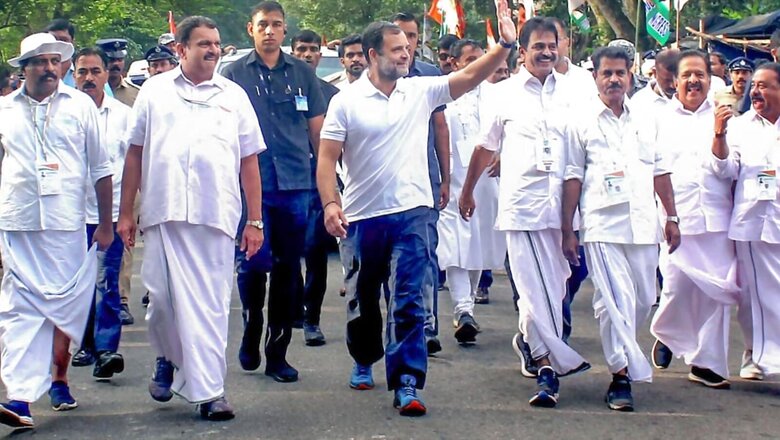
views
It is an era where words matter but visuals matter more. The Congress on its Bharat Jodo Yatra (currently in Kerala) released a poster that depicted the old uniform of the RSS in flames. It could be viewed as mere political signalling, but given the history of violence meted out to RSS volunteers in the southern state, it takes on a much more sinister significance.
The BJP has highlighted the provocative nature of the image and the Congress has countered the accusation by offering justifications. But away from the rhetoric, it is important to understand the facts and the history of this violence and why the image is posturing that even the CPM (now in the second term of its strong man Chief Minister Pinarayi Vijayan) has attempted to distance itself from.
Political violence in Kerala has only been highlighted in the last few years after decades of orchestrated silence, leaving the public outraged. Inarguably, this censure has prompted the Chief Minister to step in using his credentials as a strongman from the district of Kannur, known for its political violence. Vijayan has attempted to rein in his cadre with moderate success. It is however an act of self-preservation and no doubt a temporary rapprochement. The CM’s own past is shrouded in accusations of violence, the relative calm during his rule, is more an act of self-preservation than any real change. Hence the spectre of political violence in Kerala, especially in the northern district of Kannur, also home to the CM, still looms.
In this fraught environment, for the Congress to step in and present itself as the violent alternative to the temporarily if only marginally subdued CPM, by releasing a poster of a burning RSS uniform is diabolical. Not only does it promise a violent form of retribution, in a region known for its “killing fields”, it also underlines the facetious posturing of “Bharat Jodo”, by singling out citizens based on their association. The Congress has always been quick to expunge those with RSS links from government institutions when in power, an unannounced boycott has impacted the lives and careers of many people associated with the nearly 100-year-old organisation, but at least there was no targeted violence.
In its long years in power, the Congress has followed this ideological apartheid with sophistry but refrained from violent targeting. In this age when the political party is seeing its spiral into irrelevance, it is an act of cynical desperation to resort to such gimmicks to re-emphasise its presence by appropriating thug-style politics. The Congress taking on this stance is in contradiction to its approach to political violence in Kerala. In the past, it has maintained a studied silence when its workers were attacked and killed by CPM workers, much to the dismay and disillusionment of their local cadre in Kannur. It was felt that national concerns and closeness to the CPM in New Delhi — Sitaram Yechury and Rahul Gandhi are known to be close — had led to this strategic silence. To see them launch themselves as a version of the CPM in Kerala is cynical politics which will not impress the hardened CPM cadre in Kerala or impress their local cadre which is far more threatened by the communists than the RSS.
The Congress disconnect with the realities on the ground is legendary and doesn’t need to be elaborated on, especially in this piece that hopes to raise public awareness (yet again) about the delicate balance of peace in Kerala, when it comes to political violence. Hence it is essential to not dismiss this as mere political posturing and rhetoric but see it for what it is — a call to violence. The consequence of not addressing this matter in a serious vein, is gruesome violence, the kind that one saw in ISIS-controlled territory and this is not an exaggeration — hackings, skinnings, stabbings, and bombings it’s all been seen in Kerala among political factions.
The number of victims of political violence runs into hundreds if not thousands. The history of this violence is over four decades old and it has shadowed the politics of this highly literate and cultured state. It was often brushed under the carpet, but once exposed it was decried by most who felt that this sort of violence has no place in a civilised democracy. The attempts of civil society to raise awareness and condemn this violence are being undermined by a political party on a journey of rehabilitating its political fortunes.
We must demand better from our politicians, especially when their utterances and “strategies” endanger the lives of people. Irrespective of political beliefs, it is imperative to call out this violent narrative and political cynicism. In India’s 75th year of Independence, we owe at least this much to the Gandhian values we were born into, even if the party that once claimed to be its “inheritor” has abdicated.
Advaita Kala is a best-selling novelist and award winning screenwriter. The views expressed in this article are those of the author and do not represent the stand of this publication.
Read all the Latest Opinion News and Breaking News here



















Comments
0 comment